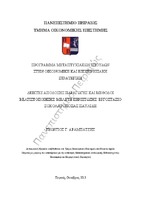Δείκτες απόδοσης παραγωγής και μέθοδοι βελτιστοποίησης. Μελέτη περίπτωσης: εργοστάσιο σοκολατοποιίας Παυλίδη
Production performance indicators and improvement methods. Case study: Pavlides chocolate plant

Προβολή/
Θεματική επικεφαλίδα
Στρατηγικός σχεδιασμός ; Επιχειρηματικός προγραμματισμός ; Απόδοση -- Μέτρηση ; Industrial productivity -- MeasurementΠερίληψη
Το σύγχρονο ανταγωνιστικό περιβάλλον αλλά και η περίοδος της παγκόσμιας οικονομικής ύφεσης που διανύουμε, επιβάλλει στις επιχειρήσεις και τις βιομηχανίες, την υιοθέτηση πρακτικών και μεθόδων που στοχεύουν στη συνεχή βελτίωση των διεργασιών τους. Ουσιαστικά, η ανάγκη για ποιοτικά, ασφαλή αλλά και χαμηλού παραγωγικού κόστους προϊόντα, είναι αποτέλεσμα επιχειρησιακών στρατηγικών διοίκησης, άριστα ευθυγραμμισμένων με την σημερινή πραγματικότητα. Ωστόσο, όπως πολύ εύστοχα αναφέρθηκε από τον Peter Drucker «Δεν είναι δυνατόν να διαχειριστείς κάτι που δεν μπορείς να ελέγξεις και δεν μπορείς να ελέγξεις κάτι που δεν μπορείς να μετρήσεις». Συνεπώς, ο έλεγχος και η διοίκηση της απόδοσης απαιτούν μετρήσεις, οι οποίες θα ποσοτικοποιήσουν τις επιδόσεις της επιχείρησης και ταυτόχρονα θα αποτελέσουν τη βάση για στοχοθέτηση και βελτίωση. Ως μέτρηση της απόδοσης λοιπόν, μπορεί να ορισθεί ο βαθμός εκπλήρωσης των πέντε βασικών της στόχων, που είναι η ποιότητα, η ταχύτητα, η αξιοπιστία, η ελαστικότητα και το κόστος. Η στατιστική επεξεργασία των μετρήσεων απόδοσης, οδηγεί στην δημιουργία δεικτών, που προσφέρουν την «ευθυγράμμιση» της επιχείρησης με τους στρατηγικούς της στόχους, αλλά και την αξιολόγηση της απόδοσης της. Η βελτίωση των διεργασιών και κατ’ επέκταση των βασικών δεικτών απόδοσης, πραγματοποιείται με την εφαρμογή μεθόδων και τεχνικών όπως το Kaizen, το 6 σίγμα και η Διοίκηση Ολικής Ποιότητας. Οι κυριότερες μέθοδοι που σχετίζονται με την εφαρμογή των τεχνικών αυτών, είναι ο κύκλος του Deming, το SMED, το 5s, το DMAIC κ.α. Οι προϋποθέσεις εφαρμογής, η προσέγγιση της βελτίωσης αλλά και τα αποτελέσματα της κάθε μεθόδου, διαφέρει. Ωστόσο, στόχος παραμένει η βελτίωση, η οποία μπορεί να επιτευχθεί ακόμη και με την παράλληλη εφαρμογή τους. Στα πλαίσια της παρούσας διπλωματικής εργασίας, πραγματοποιείται μια αναλυτική σύνδεση των Βασικών Δεικτών Απόδοσης παραγωγής, με τις σύγχρονες μορφές Βελτίωσης. Αναλύεται τόσο η επεξεργασία των μετρήσεων απόδοσης, στο σύστημα αναφοράς «Waterfall», από το οποίο προκύπτουν οι Βασικοί Δείκτες Απόδοσης παραγωγής, όσο και οι τεχνικές Kaizen και 6 σίγμα, που αντιπροσωπεύουν τη συνεχή και ριζοσπαστική βελτίωση αντίστοιχα. Παράλληλα στοχεύουν στην βελτίωση της απόδοσης και της ποιότητας των διαδικασιών. Επιπρόσθετα, ως μελέτη περίπτωσης, παρουσιάζεται η εφαρμογή ενός έργου Συνεχούς Βελτίωσης (Kaizen Event) στο εργοστάσιο Σοκολατοποιίας Παυλίδη, της Mondelez International και παρατίθενται τα αποτελέσματά του. Η εφαρμογή των τεχνικών αυτών από βιομηχανίες και οργανισμούς ανά τον κόσμο, έχει να επιδείξει εντυπωσιακά αποτελέσματα βελτίωσης στην απόδοση και στη παραγωγικότητα. Η εστίαση στην απόδοση, την ποιότητα και τη συνεχή βελτίωση των διεργασιών, συντελεί στην ανάπτυξη συγκριτικού πλεονεκτήματος για την επιχείρηση και συνεπώς στην διατήρηση της βιωσιμότητας και στην αύξηση της κερδοφορία της.

